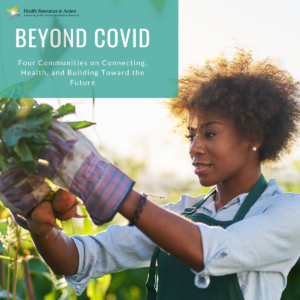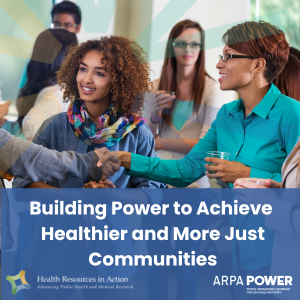 Health Resources in Action (HRiA) looks forward to participating in the American Public Health Associations (APHA)’s annual meeting in Atlanta, GA on November 12-15, 2023! Below, you’ll find a list of our team members attending the conference, information on presentations, and curated content and resources to learn a bit more about us. We hope to see you there!
Health Resources in Action (HRiA) looks forward to participating in the American Public Health Associations (APHA)’s annual meeting in Atlanta, GA on November 12-15, 2023! Below, you’ll find a list of our team members attending the conference, information on presentations, and curated content and resources to learn a bit more about us. We hope to see you there!
Presentations
Common goals, different approaches: Lessons learned from the co-creation of telemedicine maternal health interventions in two rural areas of Honduras and Peru
Ariadna Capasso1, Mercedes Colomar2, Suzanne Serruya2, Bremen DeMucio2. (1) Health Resources in Action, (2) Pan American Health Organization.
Sunday, November 12th – 3:15 PM
Timely antenatal care is critical to saving lives, but disparities exist in access. Telemedicine–using digital technologies to deliver health services–is a promising strategy to extend coverage of essential maternal health services in underserved communities. One-size-fits-all interventions developed through top-down approaches have limited effectiveness and sustainability. This abstract describes the use of participatory co-creation approaches to design and implement context-specific maternal health interventions in Honduras and Peru.
Assessing advocacy that builds power through the American rescue plan act (ARPA)
Erika Gaitan, Benjamin Wood, Mo Barbosa, Cynthia Espinosa Marrero, Christine Gordon-Davis, Edward Alexander, Karen Schoneman, Lex Vazquez, Kathleen McCabe
Sunday, November 12th – 5:00 PM
The American Rescue Plan Act (ARPA) presents historic funding opportunities for communities across the nation to invest in upstream factors to ensure an equitable recovery from the COVID 19 pandemic. ARPA funds can be truly transformational, both as a process to build community power, and because of investments that address community defined priorities and the social conditions that lead to opportunity or disadvantage. In this session, HRIA reflects on learnings of inside/outside approaches with municipalities across Massachusetts working to advocate for community engaged decision-making processes and build community power in relation to ARPA allocations. Inside/outside strategies are based on an understanding of power dynamics within organizations and communities; they leverage the power of internal change agents and community partners in strategic ways to overcome entrenched practices that perpetuate inequity.
Convening violence prevention ecosystems to advance public health linkages: Insights from four U.S. cities
Natalie Johnson, Anna Thordarson, Laurie Jo Wallace, Mo Barbosa
Monday, November 13th – 10:30 AM
Communities and city leadership must take inventory of existing initiatives along the spectrum of violence prevention and intervention, identify gaps, and develop and fund solutions with an eye toward sustainability. This session will describe HRiA’s process for inventorying and convening the violence prevention and intervention ecosystem in four cities: Atlanta, GA; Boston, MA; Milwaukee, WI; and Oakland, CA. To inform the convenings, HRiA is conducting a landscape assessment of each city’s violence prevention and intervention ecosystem and key informant interviews with community stakeholders. The team will present comparative findings from each city’s landscape assessment, including violence data and political context and climate, co-concurrent factors that influence violence, partnerships with local public health, community voice, and existing intervention and prevention strategies.
Employment conditions of violence prevention professionals as a barrier to implementing hospital-based violence intervention programs: Lessons learned from a New Jersey cohort
Ariadna Capasso1, Heather Nelson1, Joe Kim2, Princess Fortin2. (1) Health Resources in Action, (2) The Health Alliance for Violence Intervention.
Monday, November 13th – 10:30 AM
In 2019, the Health Alliance for Violence Intervention (HAVI) received funding to provide training and technical assistance (TTA) to nine emerging and existing HVIPs across New Jersey (NJ). The cohort provides an opportunity to examine HVIP implementation processes. This session will describe the methods, results, and conclusions of this program evaluation.
Collaborating to advance vaccine equity: Co-creating a catalogue of promising practices with community-based organizations
Tracy Wharton1, Ilana Raskin2, Nora J. Daly2, Emily Costello1, Erin Uy3, Lisa Wolf2, Sabrina Selk1. (1) National Network of Public Health Institutes, (2) Health Resources in Action, (3) Spitfire Strategies.
Monday, November 13th – 12:30 PM
Community co-creation was key to reaching communities deeply hesitant about COVID-19 vaccination. Five CBO partners on the Vaccine Equity Project and three coordinating organizations worked with more than 30 ethnic/racial/identity communities in more than 25 languages over the course of a year, creating more than 376 focused materials that were responsive to community needs. In this session, presenters will share materials and lessons learned on implementation strategies for community-based organizations.
Redefining men of color’s health: Building a baseline for a post COVID world
Moacir Barbosa1, Richard Harding2. (1) Health Resources in Action, (2) Cambridge Public Health Department.
Tuesday, November 14th – 10:30 AM
The Men of Color Resilience and Equity Survey (MOCRES) seeks to build an understanding of how social and economic factors have affected the health of men of color directly and indirectly, shaped their health and help seeking behaviors, how COVID has affected their lives and their perceptions of healthcare, and how SDOH continue to impact their health. The impact of these results is to fundamentally change the baseline from which we are working to support the health of men of color, and build an understanding of what it takes to support the health of men of color in deeply unhealthy environs.
A scoping review of alternative emergency responses: Fostering equity when responding to mental health and other crises
Victoria Tran1, Mo Barbosa1, Mark Fine2, Angela Kelly1, Ariadna Capasso1. (1) Health Resources in Action, (2) Metropolitan Area Planning Council.
Tuesday, November 14th – 3:00 PM
A history of police brutality when responding to emergencies in communities of color have catalyzed national conversations on addressing institutional racism in public safety. These have led to calls for alternative programs to improve equity in emergency response and to fill the unmet need for compassionate care in mental health emergencies and other crises. We aimed to examine alternative emergency response programs in the US to understand their key components. In this session, we share the results of this literature review, including key program components of alternative emergency response programs.
Content and resources
Related blog posts

COVID-19’s federal emergency status was lifted in May 2023, yet the recovery from its impacts is far from over. To mark this important milestone, we asked four community-serving organizations in Massachusetts to reflect on the effects of the pandemic on their communities, the strategies they used to care for each other, and their vision for a future beyond COVID.

Power lies at the heart of health and racial justice, shaping our society’s structures. It determines access to resources, who makes decisions, who thrives, and who is left behind. In this post, we introduce the concept of power and demonstrate the importance of building sustained power within communities through the example of federal funding from the American Rescue Plan Act, or ARPA.
Our Team
















